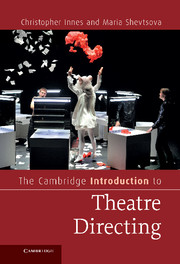Book contents
- Frontmatter
- Contents
- List of illustrations
- Acknowledgements
- Introduction
- Chapter 1 Traditional staging and the evolution of the director
- Chapter 2 The rise of the modern director
- Chapter 3 Directors of theatricality
- Chapter 4 Epic theatre directors
- Chapter 5 Total theatre: the director as auteur
- Chapter 6 Directors of ensemble theatre
- Chapter 7 Directors, collaboration and improvisation
- Notes
- Select bibliography
- Index
- References
Chapter 6 - Directors of ensemble theatre
Published online by Cambridge University Press: 05 April 2013
- Frontmatter
- Contents
- List of illustrations
- Acknowledgements
- Introduction
- Chapter 1 Traditional staging and the evolution of the director
- Chapter 2 The rise of the modern director
- Chapter 3 Directors of theatricality
- Chapter 4 Epic theatre directors
- Chapter 5 Total theatre: the director as auteur
- Chapter 6 Directors of ensemble theatre
- Chapter 7 Directors, collaboration and improvisation
- Notes
- Select bibliography
- Index
- References
Summary
The directors who feature in this chapter have the goal of ensemble theatre, as first envisaged by Stanislavsky, even if all follow their own path to advance the possibilities of directing. This influence has been world-wide. Some, like Harley Granville Barker in Britain in the 1910s, furthered Stanislavsky’s principles, not least the principle of ensemble acting, without fully realizing them. Joan Littlewood too promoted ensemble practices in the Theatre Workshop (thus renamed in 1945), drawing on the examples of both Stanislavsky and Brecht that led to productions such as her seminal Oh What a Lovely War in 1963; and Peter Hall was inspired by the idea of a creative ensemble when he founded the Royal Shakespeare Company in 1961. Then, too, there are directors who, like Elia Kazan in the United States, have come out of Method Acting, Lee Strasberg’s particular take on Stanislavsky’s ‘system’.
However, ensemble theatre has a particularly firm tradition in Eastern Europe that has continued unbroken to the present in, for instance, the meticulously crafted productions of Krystian Lupa in Poland, where Stanislavsky’s legacy as regards ensemble work came via Juliusz Osterwa. Osterwa had come into contact with the Moscow Art Theatre when, in the mid 1910s, he directed in Moscow. The younger generation of Polish directors exemplified by Krzysztof Warlikowski and Grzegorz Jarzyna, both of whom were assistant directors to Lupa before taking off on independent careers, rely on finely tuned ensemble playing for the impact of their productions.
- Type
- Chapter
- Information
- The Cambridge Introduction to Theatre Directing , pp. 185 - 217Publisher: Cambridge University PressPrint publication year: 2013

